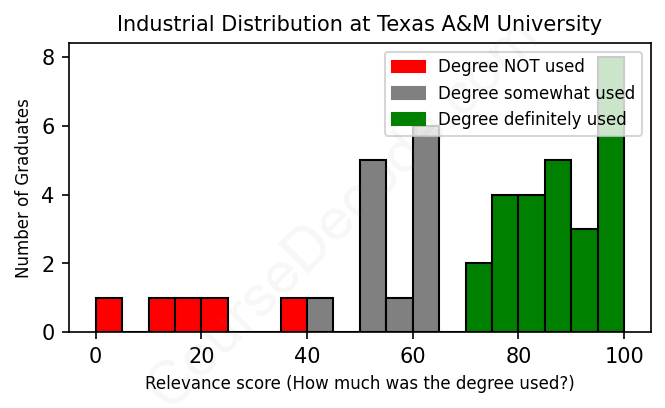
First, some facts. Of the Industrial Distribution graduates from Texas A&M University we've analyzed , here's how many have used (or NOT used) their degree in their career:

These are estimates based on AI analysis of 44 LinkedIn profiles (see below).
The verdict? Slightly above average. Overall, with an average relevance score of 70%, Industrial Distribution graduates from Texas A&M University have a slightly higher likelihood (+3%) of finding work in this field compared to the average graduate across all fields:
And for comparison, here's the chart for all profiles we've looked at across all degrees.
Also, after graduating, only 15% of these graduates have pursued further education other than another Bachelor's degree (such as a Masters degree or other), compared to the average across all profiles of 35%. This suggests a Bachelors degree is enough for most Industrial Distribution graduates, and it's normal to look for work straight after graduation.
See the details:
|
Relevance score: 100% We think this person has gone into a career highly relevant to their degree. We think this person has gone into a career highly relevant to their degree.
DEGREE INFOGraduated in 2021 from Texas A&M University with a Bachelor of Science - BS in Industrial Distribution. No other secondary education since. JOB HISTORY SINCE GRADUATIONSystem Sales Intern Streamline Integrated Technologies, Inc. May 2021 - Present Systems Engineer  Streamline Integrated Technologies, Inc. Aug 2021 - Present ABOUTExcelling in designing automated solutions for material handling and storage. Skills include conducting site surveys, analyzing inventory data, creating facility drawings, managing vendor relationships, and creating solution proposal documents. |
The top 10 most common jobs done by the graduates we've analyzed (ranked most common to least) are:
Here is a visual representation of the most common words in job titles for Industrial Distribution graduates (this is across all Industrial Distribution graduates we've analyzed, not just those who went to Texas A&M University):

Graduates from the Industrial Distribution program at Texas A&M University tend to carve out some solid career paths after school, especially within logistics, supply chain management, and sales roles. Many start their journeys in positions like logistics specialists, procurement analysts, or roles in sales and operations that help them get hands-on experience in the industry. For instance, it’s common to see graduates beginning their careers in entry-level roles that provide exposure to supply chain processes or customer interactions, setting a strong foundation for future growth.
Fast forward five to ten years down the line, and many graduates are climbing the ranks within their companies or transitioning into more advanced roles, like supply chain coordinators, sales managers, or even senior analysts. The data shows a good number of successful transitions into leadership positions, which is promising. While a few individuals may take different routes or end up in unrelated fields, the overall trajectory seems favorable, with a majority staying relevant to industrial distribution and demonstrating career growth. In summary, if you're considering this path, it looks like a worthwhile investment for a fruitful career in various industries!
Honestly, a Bachelor’s degree in Industrial Distribution can be a bit of a mixed bag in terms of difficulty. At Texas A&M, it’s generally considered approachable compared to some other engineering or technical programs, but that doesn’t mean it’s a walk in the park. You'll dive into subjects like supply chain management, logistics, and inventory control, which can get pretty detailed and require a good grasp of both math and business concepts. If you’re good at problem-solving and enjoy working with numbers, you’ll likely find it manageable. Just be ready to put in some effort and stay organized; like any college degree, it’s all about keeping up with the workload and not letting things pile up!
Most commonly, in the LinkedIn profiles we've looked at, it takes people 4 years to finish a Bachelor degree in Industrial Distribution.
Looking through the career paths of these Texas A&M Industrial Distribution grads, it seems like many of them have landed solid jobs that likely pay pretty well, especially over time. For instance, roles like Supply Chain Manager, Operations Supervisor, and various positions in sales engineering usually come with decent salaries and growth potential. Some graduates moved up the ladder quickly into senior positions, which is a great sign for their earning potential. However, a few took on entry-level roles that might not pay as much initially, like teaching or administrative work. Overall, while there’s a mix, the trend leans toward better-than-average earnings in areas that are known for rewarding experience and skills. So, if you’re thinking about this major, it looks promising for your future income!
Here is a visual representation of the most common words seen in the "about" section of LinkedIn profiles who have a Bachelor degree in Industrial Distribution (this is across all Industrial Distribution graduates we've analyzed, not just those who went to Texas A&M University). This may or may not be useful:

Here are all colleges offering a Bachelor degree in Industrial Distribution (ordered by the average relevance score of their Industrial Distribution graduates, best to worst) where we have analyzed at least 10 of their graduates:
| College | Score | Count |
|---|---|---|
 Texas A&M University Texas A&M University
|
70 | 44 |